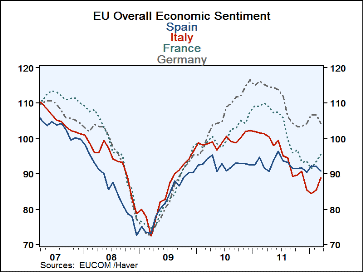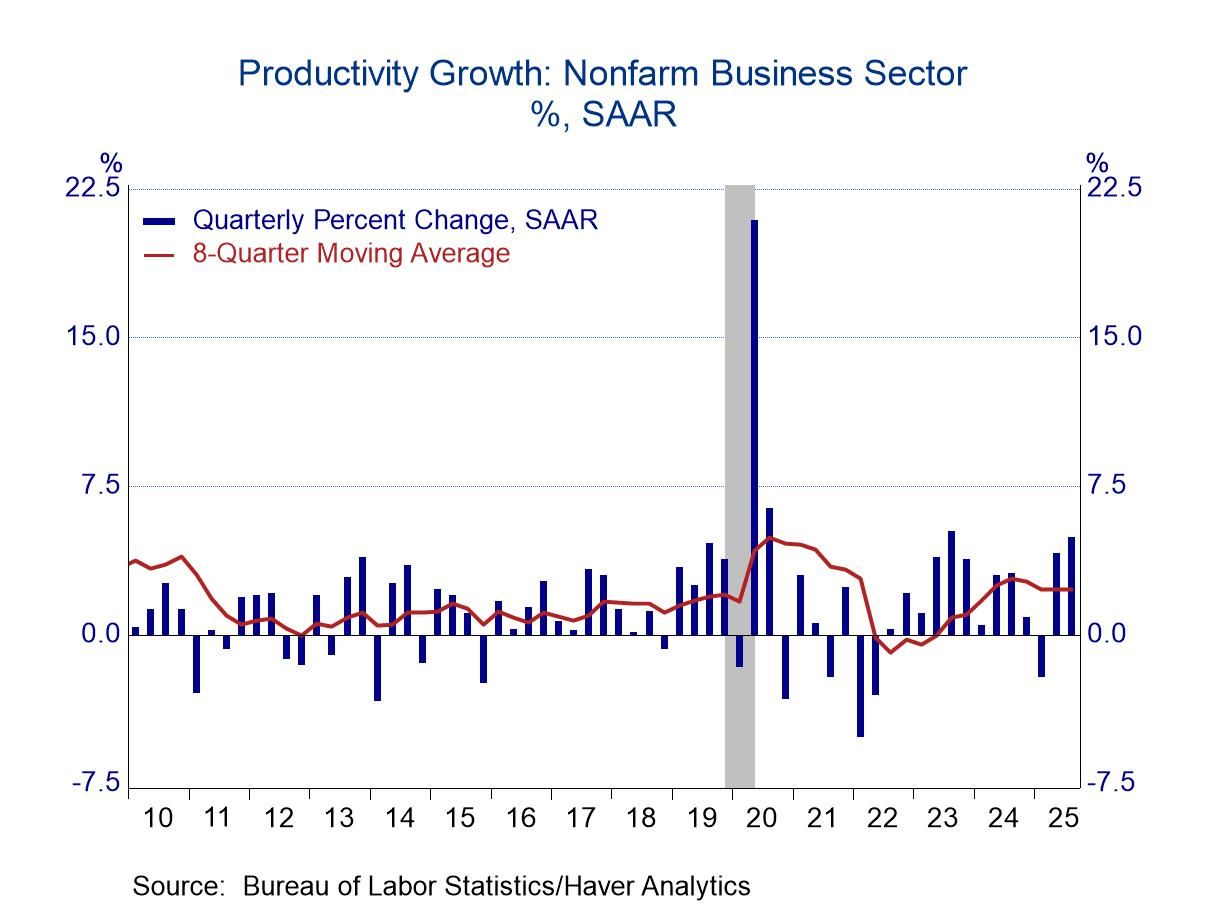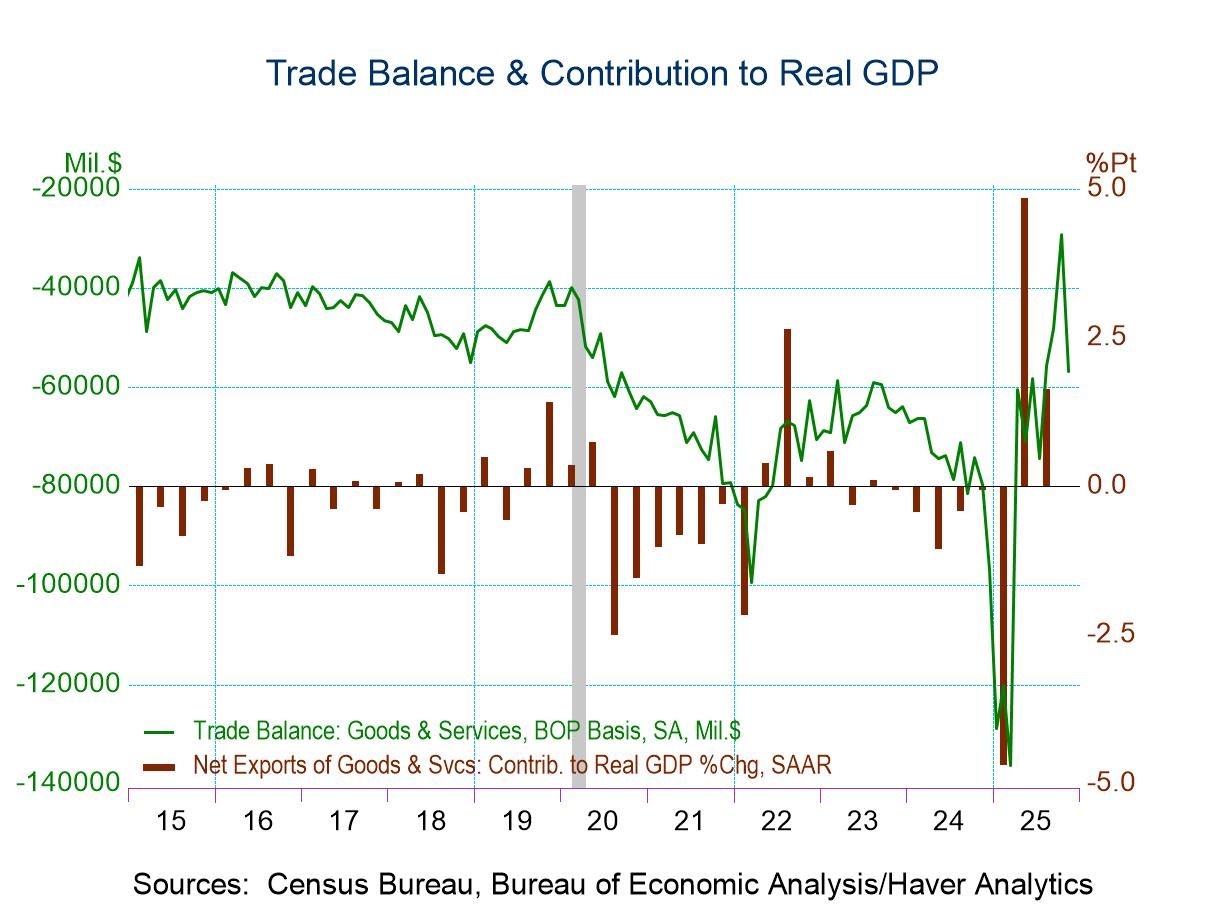 Global| Mar 29 2012
Global| Mar 29 2012EMU Indices Take Gnarled Route to Nowhere
Summary
The EMU and EU overall sentiment indices fell this month. All of the countries pictured saw their indices fall in the financial crisis/recession. All saw a strong initial recovery. Spain’s recovery topped out first, then Italy’s. [...]
 The EMU and EU overall sentiment indices fell this month. All of the countries pictured saw their indices
fall in the financial crisis/recession. All saw a strong initial recovery. Spain’s recovery topped out
first, then Italy’s. Spain’s recovery flattened out as Italy, France and Germany saw their progress
continue before turning lower. Now there is even a bigger split. While Spain flat-lines, France and
Italy show signs of moving higher while Germany, which has had fits and starts of a second wind,
is down this month.
The EMU and EU overall sentiment indices fell this month. All of the countries pictured saw their indices
fall in the financial crisis/recession. All saw a strong initial recovery. Spain’s recovery topped out
first, then Italy’s. Spain’s recovery flattened out as Italy, France and Germany saw their progress
continue before turning lower. Now there is even a bigger split. While Spain flat-lines, France and
Italy show signs of moving higher while Germany, which has had fits and starts of a second wind,
is down this month.
Overall EMU is doing slightly better than EU as the EMU queue-ranking stands in the 35th percentile of its ranked queue of data while EU stands lower just below its 29th percentile. Both are weak readings. And each is made higher mostly by the participation of Germany which carries a larger weight in EMU.
Germany is the only country in this sample of large countries and others whose overall sentiment reading is above its queue midpoint as it stands in the 65th percentile of its queue-range. After than France is the ‘best’ in its 35th percentile (where 35% means it is stronger 65% of the time and weaker 35% of it), next ‘best’ is Spain in the 17th percentile and after that, just a lot weakness.
By sector, the industrial sector is the relative strongest near its midpoint at the 48th percentile in its queue of historic values. Construction at a raw weak -29 reading is nonetheless the second strongest in its historic queue in the 34th percentile. After that it is retailing and services neck-and-neck with consumer confidence readings slipping behind at their lower 15% mark.
From some of the regional reports we have country-reported consumer confidence doing better and consumer confidence while weak did improve on the month, as did services and retailing with construction flat. But the industrial sector fell off so sharply it dragged the overall index lower on balance.
While all the queue standing measures are weak not all the range standings are as weak. The queue standings show often in the measure being assessed is weaker than its current value. In contrast the simple percentile-of-range standings plot a reading relative to each series’ own high/low observations. Greece and Portugal are exceptionally low in their hi-low range standings. If we look at sectors no EU sector is extremely low on a range basis with construction the worst off at 34th percentile with two other sector readings in their respective 30th percentiles and two more below their respective 45th percentiles. As position in its range the industrial sector is still at its 68th percentile. Since recessions happen about 7% of the time you need readings below the 10% of range of value to be really worrisome. We see that from some countries but not for any EU-wide sectors.
There is weakness in the Zone and it is widespread and the queue standings tell us that it is infrequently worse than this. But at the same time the range standings tell us that it does get MUCH worse than this and that we are not there yet except for Greece and getting close for Portugal. Therefore, in the Zone we are in a very rare weak spot but it does not compare ‘favorably’ with the depth of weakness you see in recession.
So weakness assessments by the sectors do not display the kind of abject weakness that could subject the region as a whole to recession. And with the decay in the various readings having abated and with more choppy sideways movement readily apparent, it is unclear if a serious recession will be avoided or not. While Germany is in good shape and it well positioned even in terms of its own competitiveness, we cannot say the same for much of the rest of the Zone where crushing austerity prevails and competitiveness losses remain and will remain as great impediments to recovery and to growth to say nothing of survival.
More and more investors are asking about Portugal and in these studies above Greece and Portugal line up side by side as the weakest. An S&P analyst- with the ink barely dry on the Greek bailout deal- is already talking about Greece’s need to restructure. But what Greece NEEDS is to devalue to remedy its competitiveness problem.
Spain is having strikes against its austerity program. In the UK politicians gave some ill-conceived murky advice about the potential for fuel shortages sending all motorists to top up their tanks and giving us a real world up-close picture of what happens when supply and demand go from being in balance to being disrupted by hoarding.
Maybe we should stop calling them ’policymakers’ and start calling them ‘troublemakers?’
| EU Sectors and Country level Overall Sentiment | ||||||||||||
|---|---|---|---|---|---|---|---|---|---|---|---|---|
| EU | Mar 12 |
Feb 12 |
Jan 12 |
Dec 11 |
%ile | Rank | Max | Min | Rng | Mean | By Q Rank% |
%Avg level |
| Overall Index |
93.2 | 94 | 92.8 | 91.6 | 53.2 | 203 | 117 | 67 | 50 | 100 | 19.8% | 93.5 |
| Ind | -7.1 | -5.3 | -7.3 | -7.7 | 68.6 | 131 | 7 | -39 | 46 | -7 | 48.2% | 98.3 |
| Cons Confid | -19.3 | -20.1 | -20.8 | -22.1 | 38.2 | 214 | 2 | -32 | 34 | -12 | 15.4% | 162.8 |
| Retail | -11.4 | -11.9 | -14 | -11.3 | 44.8 | 187 | 8 | -27 | 34 | -7 | 26.1% | 164.7 |
| Const | -29 | -29 | -31 | -32 | 34.0 | 166 | 4 | -46 | 50 | -19 | 34.4% | 149.5 |
| Svcs | -3.6 | -4.4 | -3.2 | -6.1 | 43.4 | 138 | 34 | -32 | 66 | 9 | 25.8% | -39.7 |
| % M/M | Mar 12 |
Based on Level |
Level | % Avg | ||||||||
| EMU | -0.1% | 1.2% | 0.6% | 94.4 | 51.8 | 189 | 118 | 69 | 49 | 99 | 25.3% | 94.9 |
| Germany | -2.2% | 0.1% | 2.2% | 104.3 | 72.0 | 88 | 117 | 73 | 44 | 99 | 65.2% | 105.2 |
| France | 2.1% | 2.3% | -2.2% | 95.5 | 48.9 | 173 | 117 | 75 | 43 | 100 | 31.6% | 95.6 |
| Italy | 4.1% | 1.2% | -1.3% | 88.8 | 34.1 | 224 | 121 | 72 | 48 | 100 | 11.5% | 89.0 |
| Spain | -1.2% | -0.2% | 2.0% | 90.9 | 43.1 | 210 | 116 | 72 | 43 | 100 | 17.0% | 90.9 |
| Greece | 1.1% | 0.0% | -1.1% | 75.7 | 8.6 | 241 | 119 | 72 | 48 | 100 | 4.7% | 76.0 |
| Portugal | 1.6% | 0.3% | 1.5% | 77.1 | 13.1 | 243 | 117 | 71 | 46 | 99 | 4.0% | 77.6 |
| Memo: UK |
-2.7% | 0.3% | 5.6% | 91.4 | 52.3 | 215 | 116 | 64 | 52 | 100 | 15.0% | 90.9 |
| All since June 1990 | 253 -Count | Services: | 186 -Count | |||||||||
| Sentiment is an index, sector readings are net balance diffusion measures | ||||||||||||
Robert Brusca
AuthorMore in Author Profile »Robert A. Brusca is Chief Economist of Fact and Opinion Economics, a consulting firm he founded in Manhattan. He has been an economist on Wall Street for over 25 years. He has visited central banking and large institutional clients in over 30 countries in his career as an economist. Mr. Brusca was a Divisional Research Chief at the Federal Reserve Bank of NY (Chief of the International Financial markets Division), a Fed Watcher at Irving Trust and Chief Economist at Nikko Securities International. He is widely quoted and appears in various media. Mr. Brusca holds an MA and Ph.D. in economics from Michigan State University and a BA in Economics from the University of Michigan. His research pursues his strong interests in non aligned policy economics as well as international economics. FAO Economics’ research targets investors to assist them in making better investment decisions in stocks, bonds and in a variety of international assets. The company does not manage money and has no conflicts in giving economic advice.






